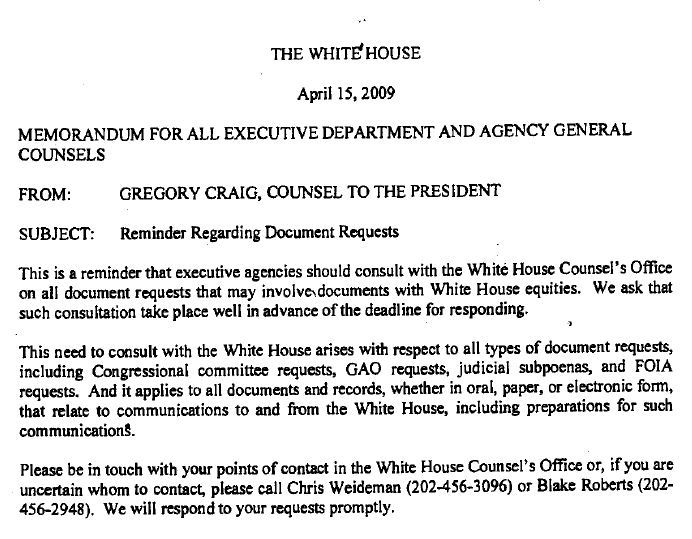On April 20, 2017, the Center for Biological Diversity (“CBD”) filed suit in the U.S. District Court for the District of Alaska challenging the Congressional Review Act (“CRA”) and Congress’s use of the CRA to invalidate the so-called Refuges Rule.[1] The suit claims the CRA violates the separation of powers and that it is ultra vires (illegal) for the Department of the Interior to honor the disapproval resolution. As explained below, these claims have little merit and although the litigation will likely not end until the Supreme Court has spoken, we believe the courts will ultimately rule the CRA is constitutionally valid.
CBD fails to acknowledge that Congress intentionally included, as a direct result of the Chadha decision, the constitutional mandates of bicameralism and presentment in the Congressional Review Act disapproval procedure.
Bicameralism and presentment is the Constitutional requirement that both Houses of the Congress pass a bill and that it be presented to and signed by the President.[2] The CRA satisfies the constitutional mandates of bicameralism and presentment two-fold. First, both Chambers of Congress passed the CRA and presented it to President Clinton, who signed it in March 1996 – satisfying the requirements of bicameralism and presentment when enacting the statute. Second, the CRA disapproval process requires that each joint resolution be an enacted law that is passed by both Chambers and signed by the President.[3] Until 2017, the CRA’s disapproval procedure had only been successfully used once because the bicameralism and presentment requirements make it difficult to pass without a unified legislative and executive government. Historical attempts to use the CRA resulted in three joint resolutions failing to pass both Chambers and five joint resolutions being vetoed by the President. These constitutional safeguards continue to restrain the unfettered use of the CRA to avoid separation-of-powers claims.
CBD refuses to acknowledge that CRA joint resolutions of disapproval conform to these constitutional requirements and are duly enacted laws.[4] CBD repeatedly claims that a CRA disapproval resolution’s constraint on future rulemaking activity violates INS v. Chadha because Congress must use the constitutionally-mandated process of bicameralism and presentment to amend underlying statutes.[5] That is, it argues that the CRA’s prohibition on the Department of Interior issuing the Refuges Rule in substantially the same form is an invalid attempt to restrain the agency. CBD’s reliance on Chadha is misplaced because Congress enacted the CRA in the aftermath of Chadha, and crafted the CRA disapproval process with Chadha in mind. While CBD is correct that the Chadha holding reiterates Congress’ obligation to use bicameralism and presentment to enact laws; CBD ignores the distinguishing facts of Chadha. In Chadha, Congress used a “single-chamber legislative veto” to overturn a presidential immigration enforcement decision. By its very name, a “single-chamber legislative veto” does not satisfy the bicameralism requirement. The legislative history of the CRA specifically mentions Congress’ decision to require the enactment of joint resolutions to avoid future Chadha-based challenges.[6] According to CBD, Congress failed to disapprove of the Refuges Rule in conformity with bicameralism and presentment. But the lawsuit details when the joint resolution was passed by each Chamber and states that “[a]fter presentment on March 27, 2017, President Trump signed the Joint Resolution on April 3, 2017.”[7]
CBD’s separation-of-powers claim must fail because, as with any other enacted law, the joint resolution disapproving the Refuges Rule satisfied the constitutional mandates of bicameralism and presentment. Having refuted CBD’s claim that CRA and the disapproval resolution for the Refuges Rule did not satisfy the requirements of bicameralism and presentment, we move to its claim that agency rulemaking authority can only be restricted by Congress when it amends the underlying authorizing statute.
CBD fails to acknowledge numerous administrative law procedural statutes that constrain agency rulemaking authority without amending an agency’s underlying authorizing statutes.
The CRA prohibits agencies from issuing subsequent rules in “substantially the same form” as a disapproved rule. This ban acts as an additional constraint on agency rulemaking authority similar to other procedural statutes found throughout administrative law. The Administrative Procedure Act (“APA”), the Regulatory Flexibility Act (“RFA”), the National Environmental Policy Act (“NEPA”), the Unfunded Mandates Reform Act (“UMRA”), and the Small Business Regulatory Enforcement Fairness Act (“SBREFA”) all restrict agency rulemaking authority by creating procedural requirements that can restrain agencies by requiring them to regulate using different alternatives based on the predicted outcomes.[8] These constraints on agency rulemaking authority help reduce separation-of-powers concerns from the other side of the coin–that Congress unconstitutionally delegated too much authority to the agency. To avoid an unconstitutional delegation of power, courts have been supportive of enforcing these procedural restraints on agency rulemaking.[9] Here, through the CRA, Congress is constraining its previously delegated legislative authority to Interior. Therefore, CBD’s claim that agency rulemaking authority may not be constrained without amendment of the underlying statute must fail.
CBD fails to acknowledge Congress’ constitutional authority to constrain agency rulemaking authority using its power of the purse.
Alternatively, Congress may approve or disapprove of agency action by using its taxing and spending powers to decide whether to appropriate funds to an agency program.[10] Appropriations riders can be tacked on to bills being considered by Congress without being related to the goals of the underlying bill. One type of these is limitation riders which often specifically prohibit the use of funds for specific agency activities or programs. Using its power of the purse, Congress can use limitation riders to prevent agencies from using any funds on programs that Congress does not approve of – without amending the underlying authorizing statute that might prescribe the agency take that action.[11] In 2000, Congress used an appropriations rider to restrict Interior’s ability to promulgate final rules concerning hard rock mining–without amending Interior’s underlying statutory authority to prescribe rock mining restrictions.[12] No limitation rider has ever been successfully challenged in court as violating the separation of powers.
The CBD lawsuit repeatedly asserts that the CRA prohibition on subsequent rules in “substantially the same form” violates the separation of powers because Interior’s underlying authorizing statute was not amended. This argument fails because it does not consider that Congress is the genesis of agency rulemaking authority.[13] These assertions ignore all prior procedural statutes that constrain agency rulemaking authority without amending the agency’s underlying authorizing statute. This argument also ignores Congress’ authority to constrain agency rulemaking authority by passing appropriations riders. Because Article I legislative authority is vested solely in Congress, the executive branch has little or no inherent authority to promulgate rules. Congress is the only branch that may enact laws to create, delegate authority to, or abolish agencies as it deems appropriate to carry out the legislative function.[14] Congress, then, may rescind the authority it delegates to agencies by enacting or repealing laws. Indeed, federal agencies, not Congress, violate the separation of powers when they usurp the essential legislative function of Congress by continuing to promulgate regulations in direct contravention of enacted laws. Therefore, CBD’s claim that Congress has “expanded its own power at the expense of the executive branch” is incorrect because agency rulemaking authority flows from Congress alone and has been constitutionally constrained by numerous prior statutes and appropriations riders.[15]
Travis Millsaps is a counsel at Cause of Action Institute. You can follow him on Twitter at @TravisMillsaps.
[1] Non-Subsistence Take of Wildlife, and Public Participation and Closure Procedures, on National Wildlife Refuges in Alaska, 81 Fed. Reg. 52,247 (Aug. 5, 2016) (the “Refuges Rule”).
[2] U.S. Const. art. 1, § 7, cls. 2, 3; id. art. 1, §§ 1, 7, cl. 2.
[3] 5 U.S.C § 801(b)(1) (referring to § 802 disapproval process).
[4] CBD Compl. ¶ 45 (claiming that any reliance by Interior on enacted joint resolution of disapproval is “contrary to law”).
[5] E.g., CBD Compl. ¶¶ 4, 21-23, 27, 44 (citing 462 U.S. 919 (1983)).
[6] CRA Legislative History, 142 Cong. Rec. at S3684 (bill sponsors citing Chadha and resolving that the case “narrowed Congress’ options to use [the CRA’s] joint resolution of disapproval”).
[7] CBD Compl. ¶ 39 (emphasis added).
[8] E.g., Administrative Procedure Act, 5 U.S.C. §§ 551 et seq.; Regulatory Flexibility Act, §§ 601-12; National Environmental Policy Act, 42 U.S.C. § 4321 et seq.; Unfunded Mandates Reform Act, Pub. L. No. 104-4; Small Business Regulatory Enforcement Fairness Act, Pub. L. No. 104-121 (1996); see generally 42 U.S.C. § 4332.
[9] See United States v. Henry, 136 F.3d 12 (1st Cir. 1998) (discussing that existence of multiple constraints on delegated legislative authority to EPA supports finding of constitutional delegation of power).
[10] U.S. Const. art. 1, § 8, cl. 1.
[11] Id. § 9, cl. 7.
[12] Pub. L. No. 106-291, § 156, 114 Stat. 922, 962-963 (prohibiting Secretary of Interior from using any funds “to promulgate final rules to revise 43 C.F.R. subpart 3809[.]”).
[13] CBD Compl. ¶¶ 2, 5, 40-42, 44.
[14] U.S. Const. art. 1, § 8, cl. 18.
[15] CBD Compl. ¶ 4.


